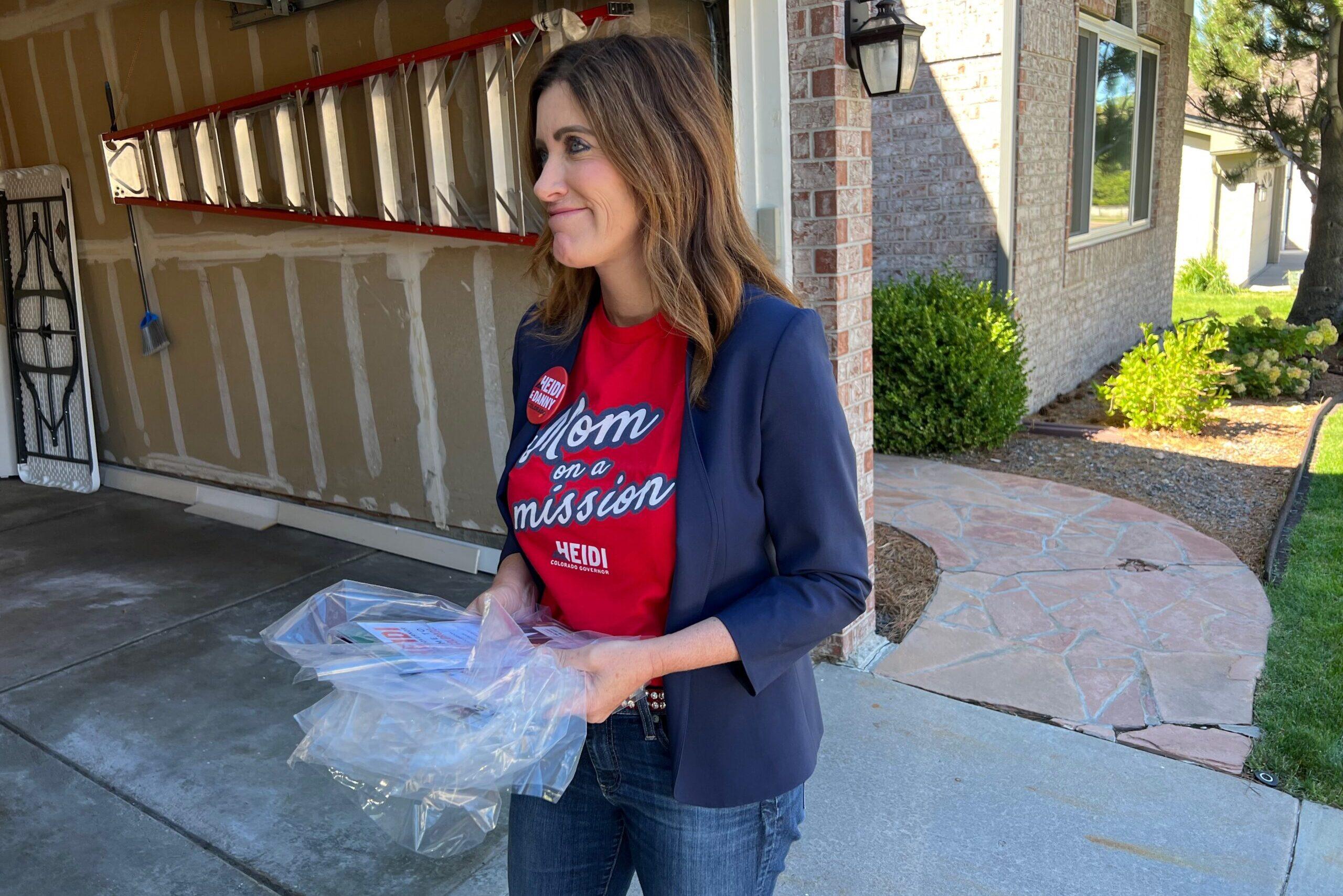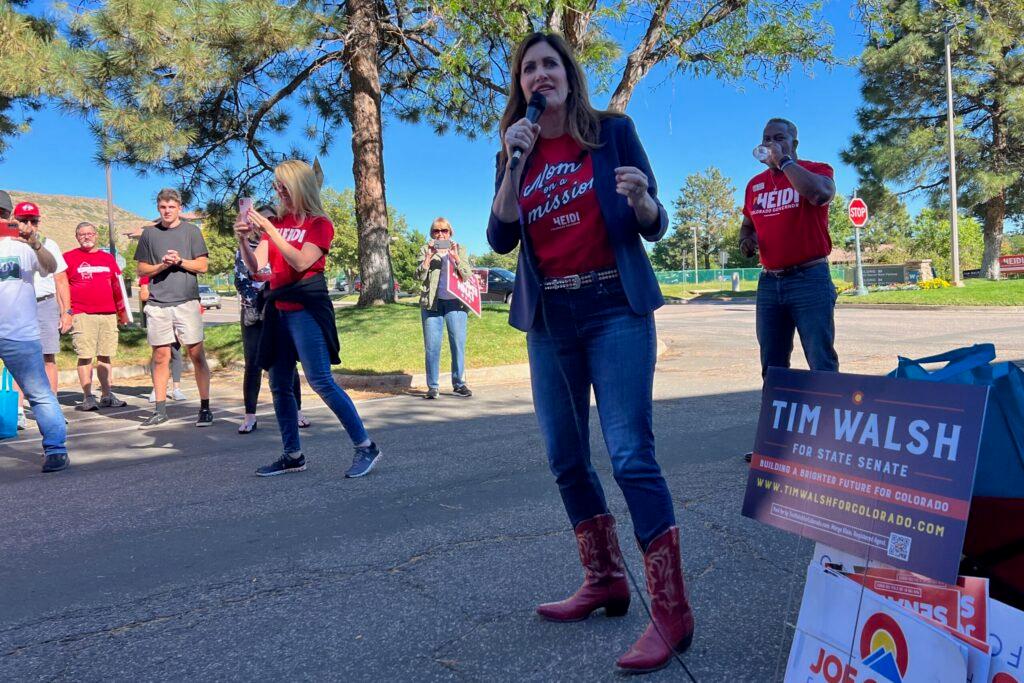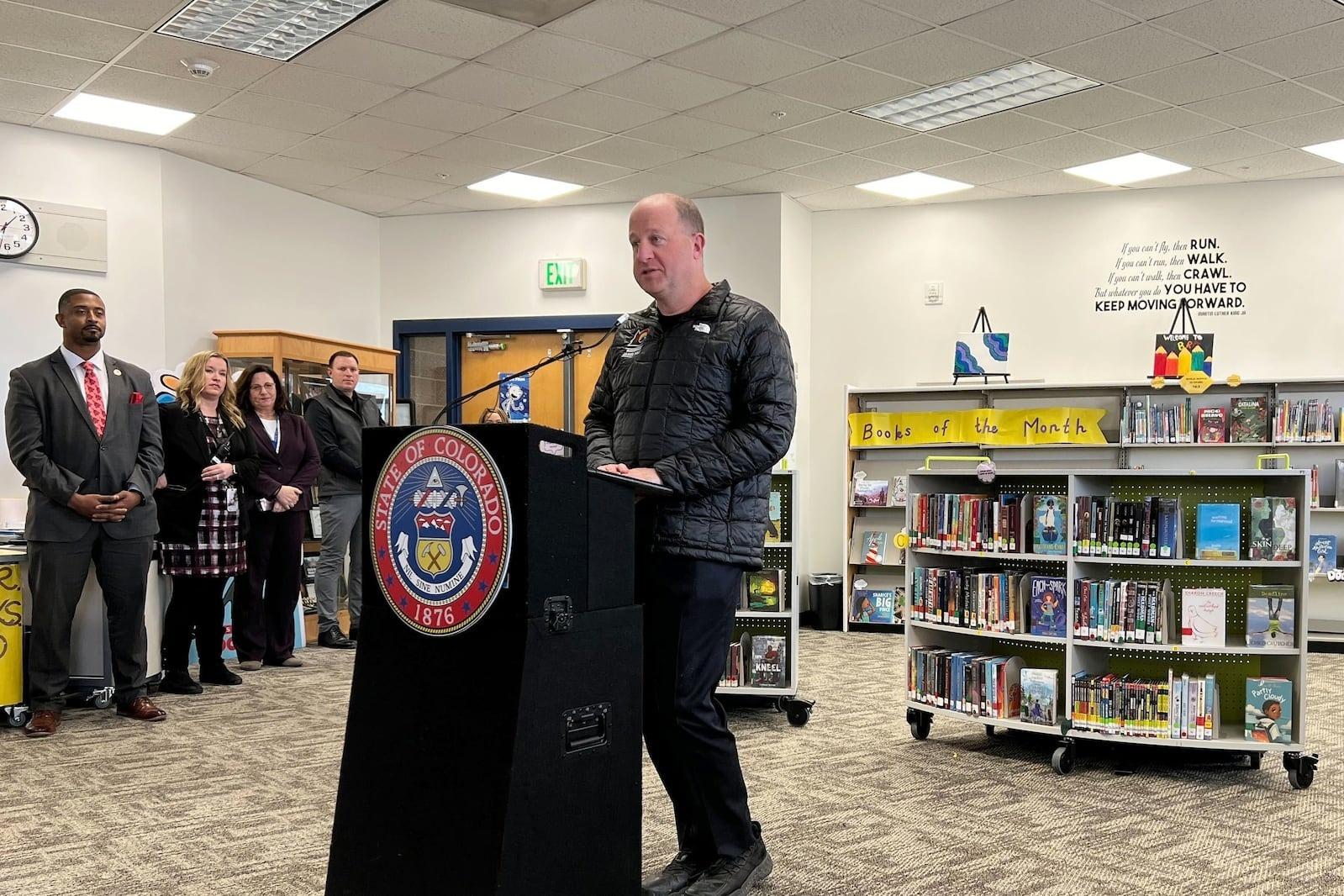
Heidi Ganahl was hustling to meet voters along a block of suburban Lakewood on a Saturday afternoon when a black GMC pulled up alongside her with its window rolled down. A voter had spotted her and wanted to talk.
“What’s your No. 1 issue?” Ganahl asked the driver, Andre Bousselaire, a Republican.
“Ha! Polis!” Bousselaire exclaimed, referring to the incumbent governor. He continued: “Between inflation, and costs of goods and services, it’s ridiculous.”
Ganahl, the Republican candidate for governor, had heard plenty about the economy in Jefferson County that day. But she steered Bousselaire instead toward another issue: the new culture war playing out in public schools.
“We were talking about what’s happening in the schools,” she told Bousselaire, referring to her conversation with an accompanying CPR News reporter.
“Oh, it’s grotesque. Out of line,” Bousselaire said. “Everything that’s going on with that (critical race theory), and introducing children to sex. How sick does it get? Just terrible.”
Ganahl nodded along. She’d found another sympathetic ear for the message that has come to define the final weeks of her run.
When the CU regent officially launched her bid for the governor’s office more than a year ago, she talked about crime and the cost of living, plus her clout as the last Republican to win a statewide office in Colorado.
But now, with just a month before Election Day, her campaign has increasingly drawn attention for its embrace of “parents’ rights,” a movement that positions itself counter to a leftist “woke” ideology that Ganahl claims is overrunning schools.
On the campaign trail, Ganahl’s staff wear T-shirts that proclaim, “Power To The Parents,” and she’s drawn support from fast-growing online groups of thousands of parents — a critical asset in a race where she lags badly in campaign spending and polling.
Recently, her embrace of the movement led Ganahl into one of the strangest news cycles of any Colorado campaign this year. She claimed on a conservative radio show last month that children are “identifying as cats … all over Colorado” and schools are “tolerating” it.
She was echoing a story that has circulated in conservative circles nationwide about costumed children running amok in schools — fueled by allegations that have generally turned out to be exaggerated or false.
In Colorado, the resulting back-and-forth led to strong objections from school districts. It’s true that some students wear animal-themed accessories to different schools, leading to a handful of complaints. But district leaders in Colorado have scornfully dismissed the idea that kitty-cat kerfuffles are disrupting classrooms, and several have contradicted the Ganahl campaign’s claims about specific schools.
“The concerns being generated by the Republican gubernatorial candidate about the Boulder Valley School District are without merit,” wrote Randy Barber, a spokesperson for that district, in an email.
Conservatives who have long challenged public schools are now pushing back against LGBTQ inclusion
The whole episode has become a late-season laughingstock for some on social media. But cat ears and fuzzy tails are only the latest permutation of a narrative that has threaded through Ganahl’s political career.
Challenging public schools has for decades been a priority for conservatives like Ganahl, who argues that parents should be allowed to use public education funding to attend private religious institutions. And the movement’s been supercharged in recent years as new fronts have opened in the nation’s long-running culture wars.
Schools’ COVID-19 policies have played a role, with frustrated parents flocking to Facebook groups. So have the pandemic’s negative effects on students’ test scores. But the movement’s focus lately has been on gender and sexuality, a reaction in part to the growing prevalence of gender fluidity and LGBTQ identities among youth and adolescents.
Ganahl and others have argued that schools are “going too far” on LGBTQ topics.
Speaking to Bousellaire in his car, Ganahl claimed that kids in Jefferson County had “learned what a sex-change operation was in second grade,” adding: “If you go onto some of the (internet) forums, you can see specific examples.” (A district spokesperson did not respond to a question about Ganahl’s allegation, nor did Ganahl’s campaign provide further detail.)
Ganahl went on to blame Jared Polis for signing a sex education update law in 2019, which called for comprehensive, age-appropriate and inclusive sex ed for districts that choose to teach the subject. The anger and upset over schools, she told Bousellaire, had helped Republicans flip control of numerous school boards last fall — and on this day of campaigning, it helped her secure one more supporter, too.
“You’ve got my vote,” Bousellaire told her before driving off.

A play about a transgender raven is part of 'why I’m running'
Asked later about her specific concerns in classrooms, Ganahl turned to a personal example she’s mentioned several times on the trail.
Woke ideology, she said, “looks like a play in Superior Elementary School about, you know, a raven that does a sex-change operation. It talks about a sex-change operation on a bird.”
She was referring to her own family’s experience at Superior, a school in Boulder County. In 2018, she and other parents learned via email that the school would be hosting a musical performance called “Raven’s True Self” about “a transgender raven … and the importance of friendship and being seen for who you are on the inside.”
A recording of a performance of the play contains no references to a “sex change,” despite Ganahl’s recollection. Instead, the main character is misidentified as a girl raven until the other animals learn to see his true self. At one point, “Dr. Squirrel” revives the ailing bird with drops of water.
Superior school officials later described the performance as a response to the bullying of a transgender student. It also came in the national context of high suicide rates for trans and nonbinary youth, with more than half of that group saying that they had considered suicide in a recent survey of 35,000 LGBTQ youth by The Trevor Project.
“This is a really a story about friendship,” said Sam Bullington, founder of Phoenix, the transgender choir that put on the performance. “It is not about bodies — it’s about friendship.”
The school initially did not offer Superior Elementary parents a way to opt out of the performance, though it later allowed students to skip the event, according to court documents in a lawsuit filed in 2020 by another family.
The school district’s handling of the incident and its fallout “is actually why I'm sitting here, why I'm running,” Ganahl said at a recent forum with supporters in Jeffco.
In another part of the 2018 presentation, several videos from YouTube channels like “Queer Kid Stuff” were shown at the school. The videos told kids that gender “rules can be broken;” celebrated cartoon penguins who explore gender expression; and described traditional gender norms as “not fun” and “mean.”
Some parents see LGBTQ-inclusive curricula as a challenge to their rights as parents or religious beliefs
Superior Elementary School was a relative rarity in presenting LGBTQ-inclusive curricula, according to Adam Crawley, an assistant teaching professor at CU Boulder.
“I would like to see these books being used more, but many teachers don't because they are fearful of parents. They are fearful of other stakeholders,” said Crawley, who studies LGBTQ curricula in elementary schools.
The schools that choose to teach these topics, like Superior, might offer books with same-sex parents, or stories about characters who are misgendered by others. That’s inherently different than the “sexual” content and levels of detail that many fear, he said.
“We don't see in the children's literature examples of hormone therapy, or we don't see surgeries taking place,” Crawley added.
But some parents, including Ganahl, saw the Superior presentation as a challenge to their own rights as parents, and in some cases to their religious beliefs.
“It was just deeply age-inappropriate. I felt that the programming really undermined who (my daughter) was as a little girl,” said BJ Jones, one of the plaintiffs, in an interview with CPR News, adding that the school had disparaged and disrespected his family. (The case was settled without any financial payment to the family or “ongoing obligations,” according to the school district. Jones said the settlement was confidential.)
“Our faith has binary. We believe in good and evil, we believe in male and female, and they’re teaching something that is not binary,” said Brecken Jones, his wife. She fears schools are “queering the classroom.”
For her part, Ganahl complained recently that the videos implied “it's rude to call somebody ‘she or he’ and assume their gender.”
Choir director Bullington said the incident was his first encounter with the parents’ rights movement that has boosted Ganahl’s campaign and others nationwide.
“One of the things I learned is how threatening it is for parents, for their kids to understand that gender is a choice. That parents would want to conceal that from their children is shocking to me, because I know just how much suffering results from that,” said Bullington, who is nonbinary trans masculine and said he long struggled because society offered him no place.

Ganahl and other parents tried to create a new charter school with conservative ties
The schism helped set a group of parents — including the Ganahls — on a mission to leave Superior and instead create their own charter school.
At the time, Ganahl was already an elected regent at the CU system. With the help of her growing influence, the group recruited hundreds of potential students, she said. They hoped to open a branch of the Ascent Classical Academies, which is affiliated with the conservative Hillsdale College.
But the effort was doomed in liberal Boulder County. Parents of LGBTQ children said they feared the Ascent school would be intolerant. The school’s non-discrimination policy didn’t “include protection for gender identity and expression,” the Daily Camera reported, though the school’s supporters argued its protections for “sexual orientation” would have covered gender identity.
“This school, I don’t believe, will accept the LGBTQ community, and when they want our policies waived, that’s a big red flag for me,” said the mother of a transgender girl at a public hearing, according to video from the meeting.
At the same meeting, as it became apparent that the school board would reject the new charter school, Ganahl addressed the district leaders. The video shows her stressing, with obvious emotion, that she loves and welcomes all people. And she said the saga had denied her kids the “American Dream” because they wouldn’t have a new school choice.
She added: “I’m gonna have to move to get them that choice.” Indeed, Ganahl soon moved her family to conservative Douglas County.
Later, she told supporters: “We got shouted out of town because they didn't want our kind there, as problematic parents, right?”
Bullington, the choir director, was surprised to hear that his group’s performance was still reverberating through Colorado’s politics.
“You’re motivated to run for governor because a trans choir came to your kid’s school, and you felt upset that you didn't have control over every thought your child had? There’s something going on there,” he said, questioning Ganahl’s statements of support for trans youth.
Parental backlash at the center of the campaign
Ganahl has made the fight over school curricula and culture a central part of her campaign, alongside crime and the economy, in the closing weeks of the race.
“I am a pissed-off mom. I’ve had enough. I’m ready to take back our state for all of our kids,” she told a crowd of Republican volunteers at a recent canvassing event in Jefferson County.
She continued: “I can’t imagine a more important thing to do right now than stop the flow of fentanyl into Colorado, to stop our streets from being riddled with crime, to stop auto theft, to stop our kids from being taught woke stuff in the classroom instead of teaching them to read and write and do math.”
The message was just what some in the crowd wanted to hear.
Fifty-four-year-old Dean Maltese’s biggest concerns, he said, were taxes, crime and “the perversion of our governor.” Asked what he meant, Maltese said he was referring to the governor “forcing sexuality on children and stuff … I could care less that he’s gay, but you don’t push that on kids.”
Some on the right have increasingly used language like this, which carries suggestions of pedophilia, to describe LGBTQ-supportive policies and curricula. The idea that the governor has done any such thing is baseless and not backed by any evidence.
A recent Colorado law requires school districts include the contributions of LGBTQ people in their social studies curricula, but those standards refer to people’s roles in history, not their sexual activity. Another law, passed in 2019, reinforces that schools that decide to teach sex-ed programs must make them “comprehensive” and “age-appropriate” and must address the needs of LGBTQ and intersex people.
Meanwhile, young parents in the canvassing crowd said they were struggling to navigate changing social norms around gender and sexuality.
“Awareness is good, but to me, it really needs to be age-specific, and I think what’s lacking right now in America is boundaries,” said Rebekah Schaapveld, the mother of a four-year-old boy who will soon enter elementary school.
“If he wants to come to me in his teens or twenties and wants to really talk about gender, absolutely, with love,” she said.” Do I want that topic planted in his head when he’s six? Absolutely not.”
Ganahl has made much the same argument. She insists her criticism of LGBTQ-related material in education has nothing to do with rejecting LGBTQ people.
“I love all kids, I love all people. Some of my best friends are gay, lesbian, trans. It just becomes an issue when you bring it into the classroom and don’t have parents involved,” she said. “I respect all people’s individual rights and especially children, and I have so much compassion for children who are struggling with gender … but if parents don’t feel like they're ready for that conversation, you’ve got to respect that.’
Bullington, of the Phoenix choir, said that stance is inherently damaging to trans kids. He wants students to know they may not fit into traditional gender expectations. Otherwise, he said, some will face “the relentless feeling of lack of belonging, that you don't have a place in the world. Everywhere you go, you’re told you don’t exist.”
Backlash related to trans youth has caught on nationwide among conservative politicians. A crop of anti-trans bills and laws has surfaced around the nation in recent years, including a Texas ban on gender-affirming care for youth.
Access to affirming spaces and policies may save lives, research shows. The recent Trevor Project survey found that respect for young LGBTQ people’s sexual orientation and gender identity is correlated with lower suicide rates, as is the use of their preferred pronouns. Hormone treatment was linked to reductions in suicidal ideation, substance abuse and mental health disorders among trans people, a Stanford University School of Medicine study found.
Ganahl’s campaign did not respond to a question about whether she would use the power of the governor’s office to push for bans on certain books or curricula in schools or restrictions on gender-affirming care for minors. Instead, on the campaign trail she’s focused more on parents’ rights over their own children’s behavior and education.
Ganahl wants to see the state legislature pass a “transparency” law. One recent version of the proposal would have required school districts to publish lists of all educational materials and provide copies upon request. Proponents said it would give parents more insight into schools, while critics argued it would be a “massive distraction,” as Colorado Newsline reported.
Ganahl also has criticized how schools handle gender at older ages. She’s pointed to Adams County, where school policies allow students to select what gender and name they’ll identify as in school, without requiring a parent’s consent.
Students in gender transition are encouraged to share that information with a parent, unless the district “determines that such disclosure would be detrimental to the student’s health, safety and/or well-being,” according to district policy.
Those policies are generally meant to protect LGBTQ youth from violence and abuse by intolerant family members. But for Ganahl, it’s another example of schools encouraging new ideas about gender and identity that may conflict with the beliefs of students’ parents.

Furries in the final weeks
With only a few weeks left in the campaign, it’s Ganahl’s claims about furries that have attracted some of the widest attention.
“It’s kids identifying as cats, and it’s actually a real thing, and it’s just the trend happening in high schools and middle schools, where they don’t talk, they’re mutes,” she told this reporter late in September.
Facing denials from school administrators and skepticism elsewhere, Ganahl’s campaign has tried to prove that animal-emulating kids really are a problem.
Public records released in recent days also showed about a dozen emails to school leaders from adults — whose identities were redacted — who said they or their children knew of students wearing costumes in Jeffco schools, with some complaining of distractions.
The Ganahl campaign also has distributed a list of schools where it says it’s heard of related issues, largely gathered through a parent-activist Facebook group. The school districts in question have denied claims of disruptions and problems, though at least one has acknowledged the presence of kids with costume ears or tails — a niche trend that’s been around for years.
In one case presented by Ganahl, CPR News confirmed that a Jefferson County school had indeed banned animal accessories this year, although another claim she made about a Douglas County school banning dog collars was denied by that district.
While it’s rallied some of her supporters, the focus on furries has prompted eye-rolling among some potential allies for Republicans.
“Conservatives are the ones ‘politicizing’ the schools over this issue, promoting a moral panic about it, and at times bullying children over totally innocent and innocuous behavior,” wrote the libertarian-leaning commentator Ari Armstrong. “In other words, Ganahl’s anti-furry campaign is a case of classic scapegoating. And it is despicable.”
Many say the movement is just a 'disguised effort to attack support for LGBTQ students'
The fracas has also brought another issue to a head: Critics claim that it’s just a disguised effort to attack support for LGBTQ students by setting up a false argument that schools are making ridiculous concessions to students’ identities, whether it’s about animals or gender.
“I think a lot of it has to do with conflation,” said CU’s Adam Crawley. “A lot of it has to do with trying to stoke fear. And a lot of it has to do with this idea of, well, if we're going to allow this, then this is going to lead to this, which is then gonna lead to that.”
They see a problem when Ganahl talks about kids “identifying” as cats, or when other Republicans, like Rep. Lauren Boebert, falsely claim that schools are offering litter boxes.
“They’re trying to demean the authenticity of trans people’s identities,” Bullington said. “It’s a form of mockery.”
Ganahl said she’s only concerned about getting rid of distracting behavior in the classroom, repeatedly rejecting allegations of transphobia. Asked what she would do about a specific school where she said the principal “had to put a stop” to animal obsessions, she said that her role is to be a conduit for aggrieved parents.
“I don’t think the governor should intervene, but I’m a voice for everything I’m hearing around Colorado,” she said. “And as I talk to more and more parents, they’re just getting more and more aggravated and upset about being left out of the conversation and what's happening in schools — just trying to bring light, even if it sounds crazy, to the stuff that’s going on.”
In a statement, the Polis campaign stressed the incumbent’s focus on ensuring educational achievement, “not extreme conspiracy theories.”
Spokesperson Amber Miller added: “Colorado communities make decisions for their own schools by electing local school boards, and parents should always know and be involved with what is going on at their kid’s school and district. Unlike his opponent, the Governor would never shame kids or families.”
For his part, Bullington sees the resurgence of the parent’s rights movement as a reaction to changes well underway in American society. For example, about 16 percent of people in Generation Z identify as LGBT, quadruple the figure for Generation X members like Ganahl, according to Gallup. Kids now see gender far differently than their parents, as decades of violent repression give way to greater acceptance of LGBT people, he added.
“Parents are reacting after the fact and trying to control something that is already out of the bag. In that sense, I feel bad for them and it’s kind of amusing,” he said. “It’s something that has already changed.”
Ballots are arriving in voters’ mailboxes, and Election Day is Nov. 8.









